A number of parents have recently contacted the school with questions regarding the curriculum content their child/ren are being taught in PSHE lessons. This suggested a lack of parent-to- teacher confidence or a lack of communication between the two. In some cases, it also showed a lack of knowledge and understanding of parents around the topics being taught. On reflection, this is an issue that has been ongoing for some time. Parents felt ‘left out of the loop’ and this caused some parents to feel a lack of trust in their relationship with the school and the curriculum it offered. Our research question was ‘How can we improve the trust, communication and educational opportunities between school and home when covering sensitive topics in school?’
Our Approach
#559 “SWERL” Supporting Wellbeing, Emotional Resilience and Learning – Ipswich Academy
What did we do?
Your approach: What did you plan to do?
We planned to cover the sensitive topic of FGM with all year groups across the school and felt parents should be informed of this beforehand. After sending a letter home, a number of parents contacted the school with concerns about their child being taught the topic. Many of the concerns were due to the parents feeling anxious about the approach and angle the school would be taking. This led to a decision to hold a Parent Learning Hub session on the topic to educate the parents about it, teaching them a similar lesson to that the students would be learning. All of the SWERL team were involved in planning and leading of the session. The response to this proved positive and showed parents were interested in learning more themselves about what their children were studying.
Activities and interactions related to the introduction and roll out of the initiatives: How did you do it?
A parent survey was completed to gauge interest in the sessions. The survey asked parents: to identify their preferred timing for the sessions, whether they wanted the sessions to be a joint session with their child or parent only, the topics they would like to be covered and finally the style in which they would like the sessions to be run. The information gained helped us to develop a plan for six Parent Learning Hub sessions across the school year (one per half term). For each sessions, we will advertise via social media, the school website, letters and text to parents and be developing leaflets. We will plan lesson-style sessions with handouts, invite visiting speakers in from professional backgrounds and provide refreshments. The challenges faced are to get a larger number of parents to feel confident and comfortable in attending. The small number that did attend found the first session hugely beneficial and built a positive and strong relationship with the staff involved.
Mobilising knowledge: How will you share and embed the learning?
Key messages to school staff, students and parents is that clear communication helps to build confidence, trust and positive relationships that lead to student success and a triangulated approach to learning. All staff have been briefed about the aims of the sessions and given the opportunity to lead sessions linked to their areas of expertise or attend any sessions they would like to learn more about.
Learning: What was learnt?
From a feedback questionnaire filled in after the session, parents felt the session was well pitched and relaxed, allowing them to feel comfortable in asking any questions they had. They also requested more sessions and offered ideas on how to improve the attendance of the sessions. Since the first session, two parents have actively contacted the school with ideas and questions, showing a positive and comfortable relationship has started to form.
Changes in practice: What did people do differently?
Parents are approaching staff more frequently, asking for information on topics such as LGBTQ+. They are also starting to feel more confident in their own knowledge about certain topics and feel they have a greater confidence and a better relationship with the school. The project is in its very early days. With greater advertising and word of mouth from parents who attended the first session, we hope for a better turnout to the next session.
Impact: What difference has it made?
So far the impact has been small, but it has improved the parent-school relationship between those who attended the first session. One student, whose parent attended the first session has since actively sought support with an issues she has been having and mentioned that her parent had advised her to speak openly with the Parent Learning Hub team.
The project aim, as it embeds, is to build a well established and triangulated relationship between the school, parents and students to ensure excellent communication and learning opportunities.

